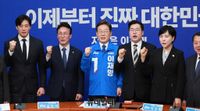On May 1, 2025, the Supreme Court of South Korea made a significant ruling regarding Lee Jae-myung, the presidential candidate from the Democratic Party, by overturning a lower court's decision that had previously acquitted him of violating election laws. This ruling not only reinstates a guilty verdict but also sends the case back to the Seoul High Court for further review.
The Supreme Court's decision is rooted in Lee's statements made during a televised appearance in December 2021, where he claimed not to know Kim Moon-ki, the head of the Seongnam Urban Development Corporation, and alleged that the Ministry of Land, Infrastructure, and Transport had pressured him during the process of changing the land use for the Baekhyeon-dong site. These statements were deemed to constitute the disclosure of false information, which is a violation of the Public Official Election Act.
Initially, Lee was found guilty in the first trial and sentenced to one year in prison with a two-year suspended sentence. However, in the second trial, the Seoul High Court acquitted him, arguing that his comments were merely expressions of opinion and should not be punishable. The Supreme Court, however, disagreed, stating that the lower court had misinterpreted legal principles in its acquittal.
The Supreme Court's ruling emphasized that both the comments regarding the golf course and the allegations related to Baekhyeon-dong were indeed falsehoods that could mislead voters. "The statements related to Kim Moon-ki and the Baekhyeon-dong project are classified as the disclosure of false information under Article 250, Section 1 of the Public Official Election Act," the court noted.
Following the Supreme Court's announcement, members of the Democratic Party expressed outrage, claiming that the judiciary was interfering in the electoral process. Kim Yong-min, a senior member of the party, characterized the ruling as a judicial coup d'état, stating, "The legal cartel has not changed at all. This is a coup d'état by the political prosecution and the Supreme Court." He was joined by Jeon Hyun-hee, who expressed strong regret about the ruling, labeling the day as "the day judicial justice died."
Additionally, Jeon Yong-gi, another party member, criticized the ruling, saying, "Law and justice have disappeared, and politics are overshadowing the judiciary." He argued that the unusual timing of the ruling and the Supreme Court's decision to send the case back for review were clear indications of electoral interference.
In light of the Supreme Court's ruling, civic groups have begun calling for Lee's resignation. The Citizens' Alliance for the Fair Election, a civic organization, stated, "The Supreme Court's ruling is not just a judicial decision; it is a stern warning to the people of South Korea about the state of political integrity. A politician who has violated the Public Official Election Act cannot represent the citizens, especially someone aspiring for the highest office in the country."
The group further added, "The era of politics filled with lies, deceit, and evasion of responsibility must come to an end. Power built on falsehoods is as unstable as a castle built on sand and will inevitably collapse under the waves of truth." They urged Lee to take political responsibility, sincerely apologize to the public, and resign from his candidacy.
The Supreme Court's ruling has ignited a heated debate about the role of the judiciary in electoral matters and the implications of this decision on Lee's political future. As the case returns to the Seoul High Court, it raises questions about how the judiciary's involvement in political matters might influence public perception and the upcoming elections.
With this ruling, the Supreme Court has made it clear that it will not tolerate any form of misinformation that could affect the electoral process. The court's decision is seen as a critical moment in South Korea's political landscape, as it underscores the judiciary's role in maintaining the integrity of elections.
As the situation unfolds, both supporters and critics of Lee Jae-myung are keenly watching how the Seoul High Court will respond to the Supreme Court's directives. The implications of this ruling extend beyond Lee himself, potentially affecting the Democratic Party's standing in the upcoming elections and shaping the broader conversation about electoral integrity in South Korea.

![대법, 이재명 `선거법 위반` 무죄판결 파기환송...유죄 취지 [현장영상+]](https://thumbor.evrimagaci.org/Lzc_S42xwZk-FNLr2YAyE_OIlLk=/200x0/tpg%2Fsources%2F4ecaec28-fbfe-4e8e-aabe-ca9318e90f74.jpeg)



